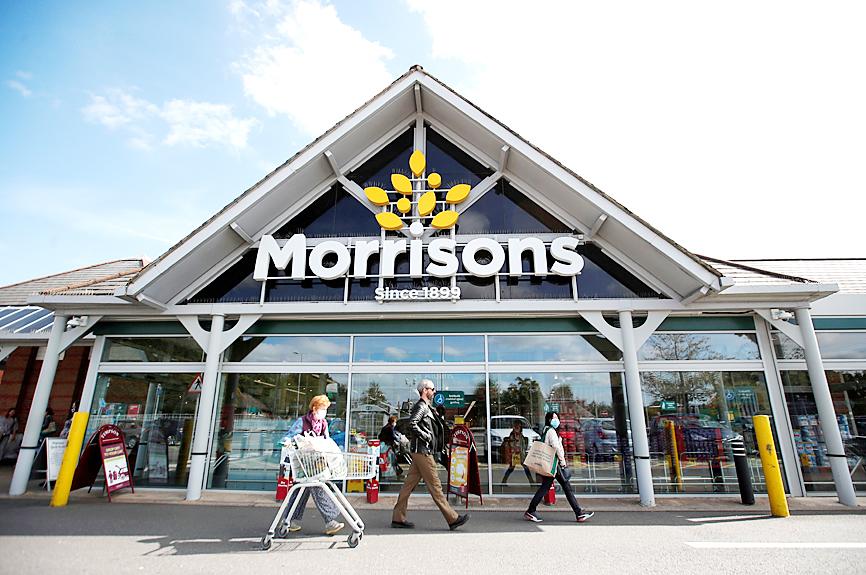The US$8.7 billion bid battle for Britain’s fourth-largest supermarket group, Wm Morrison Supermarkets PLC, ratcheted up yesterday when a third private equity group, Apollo Global Management Inc, entered the fray.
US group Apollo, which last year missed out on buying Asda Stores Ltd, the No. 3 grocery player in the UK, said it was in the preliminary stages of evaluating a possible offer for Morrisons, but had not approached its board.
Morrisons on Saturday agreed to a takeover led by Softbank Group Corp-owned Fortress Investment Group LLC that valued the firm at £6.3 billion (US$8.7 billion).

Photo: Reuters
The offer from Fortress, along with the Canada Pension Plan Investment Board and Koch Real Estate Investments, exceeded a £5.52 billion unsolicited proposal from Clayton, Dubilier & Rice LLC (CD&R), which Morrisons rejected on June 19.
However, it was less than the £6.5 billion asked for by top 10 Morrisons investor JO Hambro Capital Management Ltd last week.
Analysts have speculated that other private equity groups and Amazon.com Inc, which has a partnership deal with Morrisons, could create a potential bidding war.
Under British takeover rules CD&R has until Saturday next week to come back with a firm offer.
The Panel on Takeovers and Mergers is yet to announce the deadline by which Apollo must clarify its intentions in relation to Morrisons.
The interest in Morrisons underlines the growing appetite from private funds for British supermarket chains, which are seen as attractive because of their cash generation and freehold assets. The funds believe the stock market is not recognizing the grocers’ value in the wake of the COVID-19 pandemic.
Last year, Apollo lost out on buying Asda to the Issa brothers and TDR Capital LLP.
Apollo says its private equity business had more than US$89 billion in assets under management by the end of March, in 150 companies such as Watches of Switzerland, telecommunications, media and technology group Endemol Shine, bookmaker Ladbrokes Coral Group PLC and Norwegian Cruise Line.

Zhang Yazhou was sitting in the passenger seat of her Tesla Model 3 when she said she heard her father’s panicked voice: The brakes do not work. Approaching a red light, her father swerved around two cars before plowing into a sport utility vehicle and a sedan, and crashing into a large concrete barrier. Stunned, Zhang gazed at the deflating airbag in front of her. She could never have imagined what was to come: Tesla Inc sued her for defamation for complaining publicly about the vehicles brakes — and won. A Chinese court ordered Zhang to pay more than US$23,000 in

Taiwan Semiconductor Manufacturing Co (TSMC, 台積電) yesterday said that its investment plan in Arizona is going according to schedule, following a local media report claiming that the company is planning to break ground on its third wafer fab in the US in June. In a statement, TSMC said it does not comment on market speculation, but that its investments in Arizona are proceeding well. TSMC is investing more than US$65 billion in Arizona to build three advanced wafer fabs. The first one has started production using the 4-nanometer (nm) process, while the second one would start mass production using the

‘NO DISRUPTION’: A US trade association said that it was ready to work with the US administration to streamline the program’s requirements and achieve shared goals The White House is seeking to renegotiate US CHIPS and Science Act awards and has signaled delays to some upcoming semiconductor disbursements, two sources familiar with the matter told reporters. The people, along with a third source, said that the new US administration is reviewing the projects awarded under the 2022 law, meant to boost US domestic semiconductor output with US$39 billion in subsidies. Washington plans to renegotiate some of the deals after assessing and changing current requirements, the sources said. The extent of the possible changes and how they would affect agreements already finalized was not immediately clear. It was not known

A TAIWAN DEAL: TSMC is in early talks to fully operate Intel’s US semiconductor factories in a deal first raised by Trump officials, but Intel’s interest is uncertain Broadcom Inc has had informal talks with its advisers about making a bid for Intel Corp’s chip-design and marketing business, the Wall Street Journal reported, citing people familiar with the matter. Nothing has been submitted to Intel and Broadcom could decide not to pursue a deal, according to the Journal. Bloomberg News earlier reported that Taiwan Semiconductor Manufacturing Co (TSMC, 台積電) is in early talks for a controlling stake in Intel’s factories at the request of officials at US President Donald Trump’s administration, as the president looks to boost US manufacturing and maintain the country’s leadership in critical technologies. Trump officials raised the